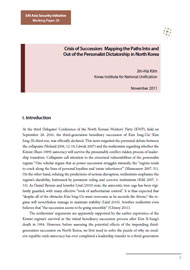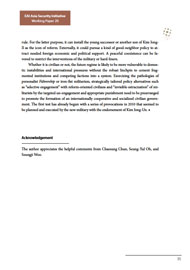 EAI Asia Security Initiative Working Paper No. 20 EAI Asia Security Initiative Working Paper No. 20 |
|
|
The successor's survival strategy to minimize the autonomy of institutions so as to maximize the vulnerability of retinues to his discretion inevitably deinstitutionalizes the regime to such an extent that the regime can survive only with the effective presence of personal dictator who functionally substitutes institutions. It then becomes unlikely that the two feasibility conditions are met concurrently. No hereditary succession is feasible any longer. That "second-time-unlucky" hypothesis systematically explains the life-cycle of modern hereditary autocracies. More importantly, it allows us to map the North Korea's future paths out of personalist dictatorship. The next hereditary succession in the post-totalitarian context could invite regime transition, by negotiation or violence, to either the party-based guardians' oligarchy or praetorians' military regime. 
 
| | |
|
|

